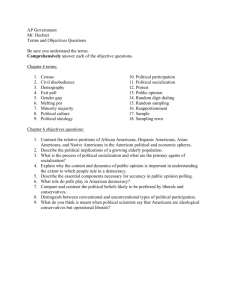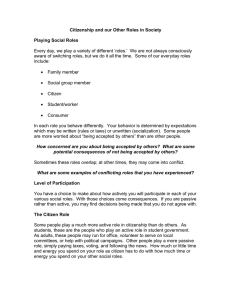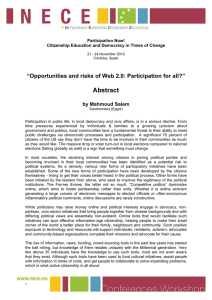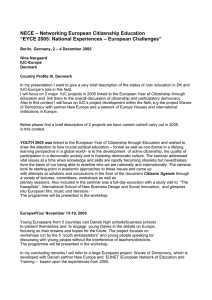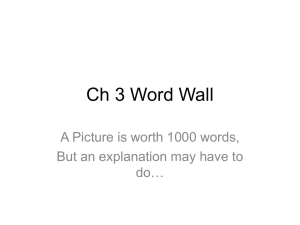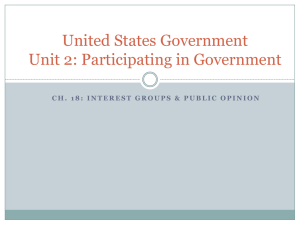UNIT 1 REVIEW SHEET MR. HALEY NAME _______________________
advertisement
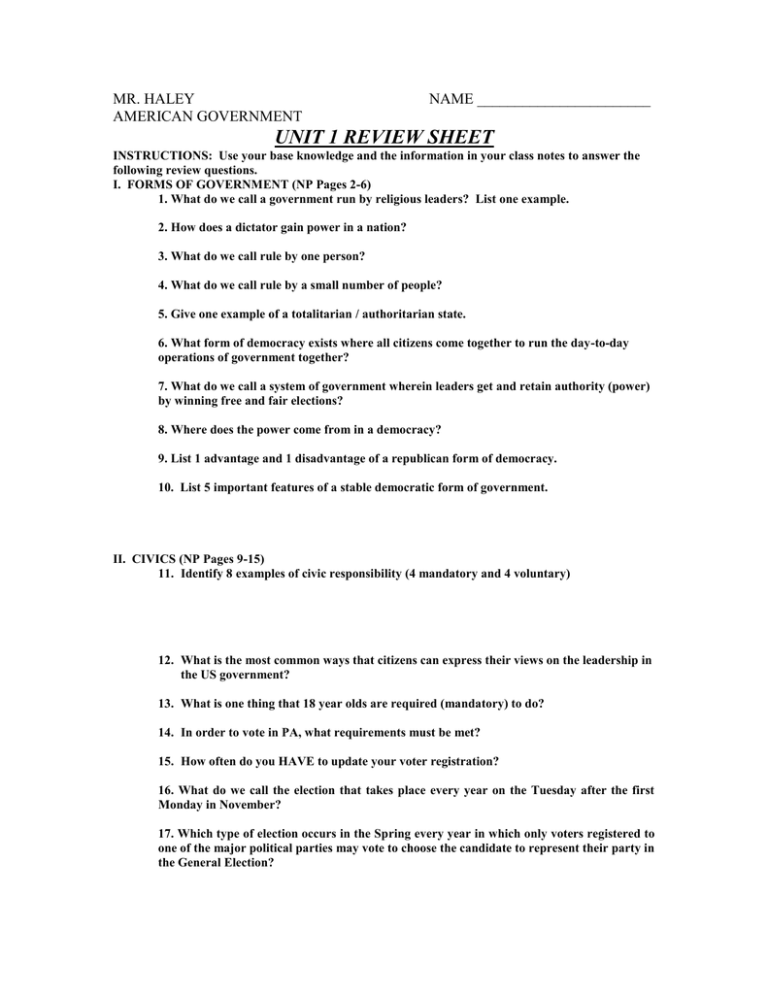
MR. HALEY AMERICAN GOVERNMENT NAME _______________________ UNIT 1 REVIEW SHEET INSTRUCTIONS: Use your base knowledge and the information in your class notes to answer the following review questions. I. FORMS OF GOVERNMENT (NP Pages 2-6) 1. What do we call a government run by religious leaders? List one example. 2. How does a dictator gain power in a nation? 3. What do we call rule by one person? 4. What do we call rule by a small number of people? 5. Give one example of a totalitarian / authoritarian state. 6. What form of democracy exists where all citizens come together to run the day-to-day operations of government together? 7. What do we call a system of government wherein leaders get and retain authority (power) by winning free and fair elections? 8. Where does the power come from in a democracy? 9. List 1 advantage and 1 disadvantage of a republican form of democracy. 10. List 5 important features of a stable democratic form of government. II. CIVICS (NP Pages 9-15) 11. Identify 8 examples of civic responsibility (4 mandatory and 4 voluntary) 12. What is the most common ways that citizens can express their views on the leadership in the US government? 13. What is one thing that 18 year olds are required (mandatory) to do? 14. In order to vote in PA, what requirements must be met? 15. How often do you HAVE to update your voter registration? 16. What do we call the election that takes place every year on the Tuesday after the first Monday in November? 17. Which type of election occurs in the Spring every year in which only voters registered to one of the major political parties may vote to choose the candidate to represent their party in the General Election? 18. In the vote? A. B. C. D. list below, circle the letter of any statement that is a reason why people do not The Person has no interest in politics. The Person does not understand the US political system. The candidates do not discuss issues that are important to the person. The person does not know where the polling (voting) place is located or how the process of voting works. E. The Person is very interested in the ideas of one of the candidates. III. CITIZENSHIP (NP Pages 16-17) 19. Which part of the US government makes the rules for immigration and citizenship? 20. In order to become President, a person has to be a “natural born” citizen. Name the way in which a person is considered to be a “natural born” citizen. 21. Can the US government revoke a person’s citizenship? 22. What do we call the process upon which citizenship is conferred on an alien? 23. What term means citizenship in 2 or more countries? 24. What term refers to the right of a person to renounce (give up) their citizenship? IV. AMENDMENTS (NP Pages 18-19) See the Moodle V. POLITICAL IDEOLOGY (NP Pages 20-22) 25. What do we call the straight line graph that shows all of the different forms of ideology? -------------------------------------------------------------------------------------------------------- Radical Liberal Moderate Conservative Reactionary 26. What term refers to the wide range of beliefs and opinions about the nature of the political system and the role of government that people hold? 27. Explain your 4 basic ideologies and examples of issues for each: Liberal, Moderate, Conservative, and Libertarian 28. What do we call the process by which families teach their children about their beliefs about government? 29. What is the most important factor (agent of socialization) in one’s political socialization? FOR THE FOLLOWING QUESTIONS, YOU NEED TO IDENTIFY WHICH IDEOLOGY LISTED BELOW WOULD SUPPORT THE POLICY STATEMENTS. A. Liberal C. Libertarian B. Conservative D. Moderate 30. One who favors limited government involvement in the economy and a strong military. ______ 31. One who favors government involvement in the economy and the belief in progress as a social goal. _____ 32. One who believes that while government should help the environment, there are still too many government regulations (rules) on the environment. _____ 33. One who believes that people should be required to pay taxes for government programs like welfare and Medicare because they help people. _____ 34. One who wants to establish more rules concerning consumer product safety to protect the health of people. _____ 35. Taxpayer supported vouchers for families with children in failing schools should be available for religious and nonreligious private schools. _____ 36. Rules on product safety are cumbersome, impractical and not permitted under the Constitution so laws about child safety seats should be abolished. ______ 37. Someone who believes that we should try to improve education. ______ 38. Someone who hates paying taxes and who believes that the government should legalize marijuana and other drugs. ______ VI. True – False Review INSTRUCTIONS: Use your general knowledge and your Unit 1 Notes packet to complete the following review questions. Mark each of the following as “T” for True or “F” for False in the left margin. 39. Democracy is distinguished (different) from other types of government because the power and authority to rule comes from the people. 40. A republic is a system where government leaders get their power and authority from heredity (being born into the right family). 41. One criticism of a representative democracy is that it is slower than autocracies and oligarchies. 42. A Representative Democracy is one in which elected officials govern on behalf of the citizens. 43. Any US citizen can rise up and become President. 44. The Chinese Government today is an example of an autocracy. 45. The national Congress has the power to set the rules for immigration into the United States. 46. A naturalized US Citizen can be deported back to their country of birth. 47. The media is the biggest single influence on a person’s political socialization. 48. North Penn School District can deny an illegal immigrant access to a free public education. 49. Under the doctrine of Expatriation, the US can revoke (take away) someone’s citizenship. 50. A Theocracy is a government controlled by religious leaders. 51. A Democratic government gives a country the best chance of solving problems over the long run. 52. An Oligarchy is the form of government that acts in the fastest amount of time during a crisis. 53. The EU is an example of a confederation. 54. A Unitary system takes all government power and divides it between the levels of government. 55. The United States is a federal system. 56. Political socialization is the process by which political values are learned and passed on to the children of the next generation. 57. Of the following, the most important role in the political socialization of MOST children is played by their family. 58. Someone who believes in the current system, but who seeks more active government involvement in order to do more for people’s rights and to promote equality would be classified as a Conservative. 59. Someone who believes in the current system and wishes to make only small changes like lowering taxes or reducing government regulations of businesses would be classified as a Liberal. 60. Political Socialization is a term that refers to a person’s ideas or beliefs about the political system and the role of the government. 61. Most Liberals are Pro – Choice and believe that a woman should have the right to choose what to do with her body. _____ 62. Most Conservatives are anti-affirmative action and believe that each person has to make their own way in life and that the government should not be giving out preferences to minorities in the hiring and promoting of workers. _____ 63. Most Liberals believe that the Democratic Party is wrong to support expanding welfare because it takes away a person’s self-reliance and initiative to solve their own problems. _____ 64. Liberals are less likely to accept social change than conservatives. _____
